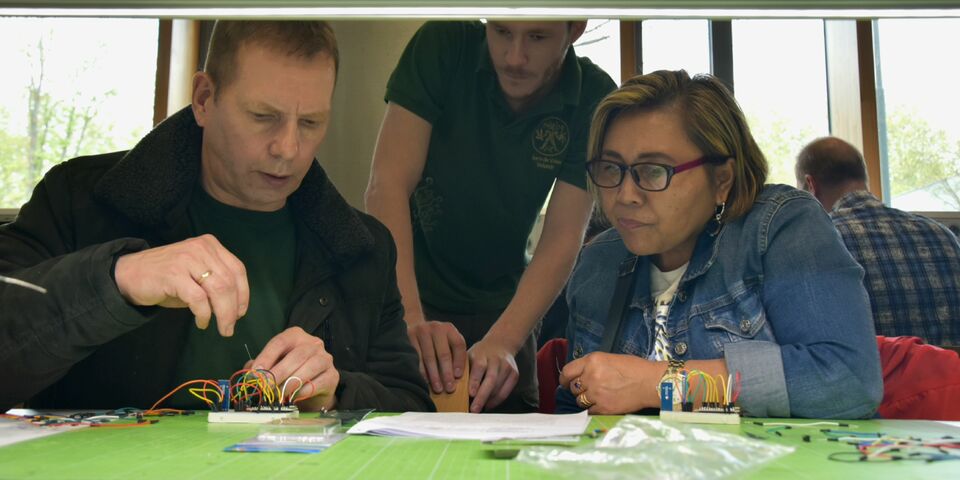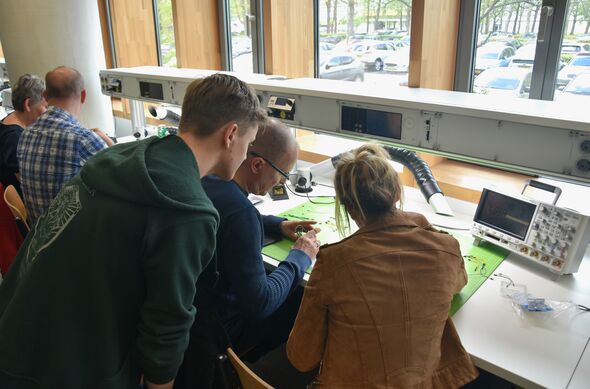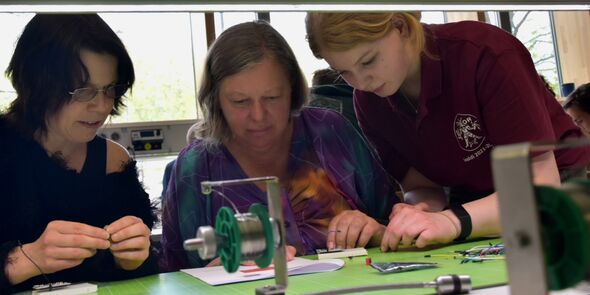Parents go to work at Electrical Engineering
Thirty parents visited parents’ day, organized by study association Thor, on Tuesday. They carried out a practical assignment under supervision of committee Volundr and attended a lecture by teacher Oded Raz. “It’s unlike anything I expected, but I had a lot of fun.”
Parents of first and second-year Electrical Engineering students are trying to put together a wireless communication board in the soldering lab at Flux. If they are successful, their microcontroller will be able to turn on a light or a small buzzer on some other parent’s device. That’s because all stations are wirelessly connected in the Mesh network.
The abovementioned business case was conceived during the lockdown period and symbolizes education at one-and-a-half-meter distance, as far as Volundr is concerned. Volundr is the committee at Electrical Engineering that provides students with practical supervision and offers them the opportunity to develop skills that aren’t part of the curriculum but that could come in handy during their future careers in industry. Students refer to Volundr as the Beun (or ‘handywork’) committee.
Volundr member and master’s student Jorn de Vries has been trying to get students to ‘work on their practical hobby’ for years. “Our department focuses more on theoretical knowledge. Practical skills are somewhat neglected here. I believe that it’s important for an Electrical Engineer to have these skills.”
All first-year students at EE need to carry out this same assignment. “Since they never had a course in electronics in high school, they don’t know anything yet. And the same is true for many of the parents who are here today,” Jorn believes.
Enthusiastic
Kathleen and Piet Nees traveled to Eindhoven from Antwerp for their daughter Anouk, who is a second-year student by now. “It’s been a terrible year for students. We want to demonstrate our commitment to our daughter,” the mother says. She enjoys the assignment, because even though she’s an electromechanical engineer by profession, she never has to piece together an electronic network in her daily work.
Diana and Christiaan van Maurik (see main photo) are also successfully working at the assignment. “This day is unlike anything I expected,” Mauritius’ father says. “He told us that we would get information and lunch, and we expected him to be here. But he’s attending a lecture now and we’re here doing the work, haha.” But Van Maurik is having a good time: “I have a screw loose when it comes to electronics, but I never developed this interest further and I currently work at a fitness center. I feel like Mozart without a piano.”
Ohm’s law
All thirty parents also attended a lecture by Oded Raz, which was much appreciated by two mothers. During their work on the assignment, they found out that they both went to the higher technical school (HTS), and Ohm’s and Kirchhoff’s laws didn’t sound unfamiliar to them. Another thing they have in common is the fact that their children (Finn van Lieshout and Ciska de Greef) were both denied to study Computer Science last year after a lottery, after which they opted for EE instead. “Ciska will continue at Computer Science next year,” her mother says. “But she had a great time here. I came to see in what building she spent so many of her days. Because despite corona, she was able to work and study here on a regular basis.” Finn’s mother is glad that he started at EE out of necessity. “He really likes it here.”




Discussion